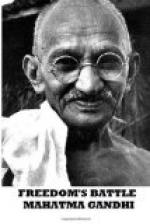Regarding the leaving of civil employment, no danger is feared, because no one will leave his employment, unless he is in a position to find support for himself and family either through friends or otherwise.
Disapproval of the proposed withdrawal of students betrays, in my humble opinion, lack of appreciation of the true nature of non-co-operation. It is true enough that we pay the money wherewith our children are educated. But, when the agency imparting the education has become corrupt, we may not employ it without partaking of the agents, corruption. When students leave schools or colleges I hardly imagine that the teachers will fail to perceive the advisability of themselves resigning. But even if they do not, money can hardly be allowed to count where honour or religion are at the stake.
As to the boycott of the councils, it is not the entry of the Moderates or any other persons that matters so much as the entry of those who believe in non-co-operation. You may not co-operate at the top and non-co-operate at the bottom. A councillor cannot remain in the council and ask the gumasta who cleans the council-table to resign.
MR. PENNINGTON’S OBJECTIONS ANSWERED
I gladly publish Mr. Pennington’s letter with its enclosure just as I have received them. Evidently Mr. Pennington is not a regular reader of ‘Young India,’ or he would have noticed that no one has condemned mob outrages more than I have. He seems to think that the article he has objected to was the only thing I have ever written on General Dyer. He does not seem to know that I have endeavoured with the utmost impartiality to examine the Jallianwala massacre. And he can see any day all the proof adduced by my fellow-commissioners and myself in support of our findings on the massacre. The ordinary readers of ‘Young India’ knew all the facts and therefore it was unnecessary for me to support my assertion otherwise. But unfortunately Mr. Pennington represents the typical Englishman. He does not want to be unjust, nevertheless he is rarely just in his appreciation of world events because he has no time to study them except cursorily and that through a press whose business is to air only party views. The average Englishman therefore except in parochial matters is perhaps the least informed though he claims to be well-informed about every variety of interest. Mr. Pennington’s ignorance is thus typical of the others and affords the best reason for securing control of our own affairs in our own hands. Ability will come with use and not by waiting to be trained by those whose natural interest is to prolong the period of tutelage as much as possible.
But to return to Mr. Pennington’s letter he complains that there has been no ‘proper trial of any one.’ The fault is not ours. India has consistently and insistently demanded a trial of all the officers concerned in the crimes against the Punjab.




